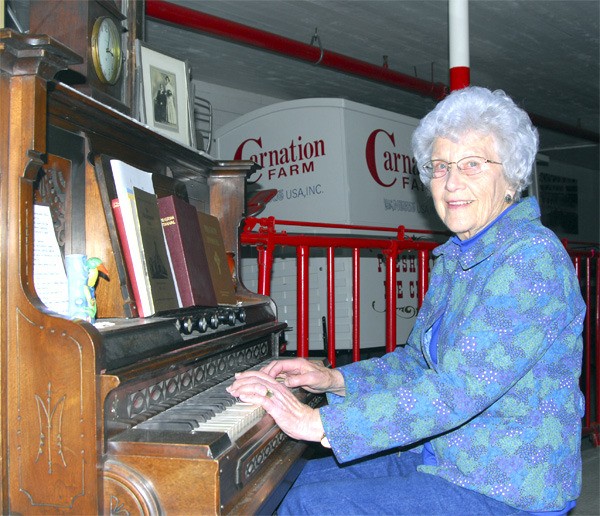Two little boys in the schoolhouse exhibit of the Tolt Historical Society museum are not quite right, and Isabel Jones is fussing over them. The boys in the desks are actually girl dolls, disguised with haircuts, jeans, T-shirts, and golf hats. They look enough like the real thing, Jones thinks, “but they wouldn’t have their hats on if they were in school.”
It’s an idea from another time, but it fits right in with most of the displays in the museum, and with their new neighbors. Now sharing space with horse-drawn carriages from the 1920s and ‘30s, the museum will re-open Saturday, April 16, in the Carnation Farm Carriage Barn.
“I think it’s great,” said Jones, who shepherded the museum through its year-long closure and relocation to the farm from the Sno-Valley Senior Center in Carnation. Great, not only because the exhibits are complementary, but also because Jones’ beloved museum artifacts didn’t just end up in storage, or scattered throughout the community, the two options facing the society when they had to move out in January 2010.
Luckily, Elbridge Stuart, owner of Carnation Farm and great-grandson of Carnation Farm founder E.A. Stuart, couldn’t let that happen. A historian himself, Stuart said in a telephone interview that it wouldn’t have been right “to have this thing dispersed and torn apart… We had lots of space and a desire to help.”
He contacted Jones after reading about the museum’s plight in local newspapers, and offered some of the 89,000 square feet of space in the old dairy barn for the museum.
“He promised us storage space,” Jones remembered. “He wasn’t sure he could give us any room to display things.”
Well, Bridge, as Jones calls him, found the space in the Carriage Room. It’s larger than the museum area was at the senior center, giving them room to add more display cases that had been tucked away in people’s homes, but in one way, there is less display space.
“We have the skis and snowshoes and logging tools that we had up on the wall at the center, but there’s not any walls here,” Jones said.
For now, they’re leaning against the pegboard that they had installed so they could hang some other items. By opening day, the items will be moved into new homes in the men’s section of the back room of the museum.
“We’ve got a lot of things to do in a week and a half,” Jones sighs as she ticks off the list, which includes ironing some of the old clothes, cleaning up the back room, marking the concrete floor for safety—it used to be a working dairy barn—rearranging things in the display cases, dusting and general tidying.
It’s still not as bad as the move was, though. Jones won’t even talk about it, but waves her hands and walks away. “It was awful!” she said. “I have lived in the same house for 60 years, and I’m not the moving kind.”
King County’s arts organization 4Culture gave the historical society a $2,500 grant to pay for the move, which took care of the big items and display cases. Everything else has been slowly hauled in over the past six months, mainly from Jones’ house where things were stored. Along with her son and daughter, she said, “Stevie and Arlene (Davidson) and Sandy and Larry (Pesch) have helped me this whole time.”
Stuart’s father sold the farm in 1985 to the Nestle Company, but last year Stuart was able to re-acquire it, through the Elbridge and Debra Stuart Family Foundation. The foundation leases the property to the Hole-in-the-Wall affiliate Camp Korey, for seriously-ill children.
“What we’re doing with the museum is just a small piece of what goes on there,” Stuart explained.
However, he has big plans for the museums, including the Tolt Historical Society’s museum.
“I’d like to expand it,” he said. “It’s all a matter of time.”
The museum open house is Saturday, April 16, from 1 to 4 p.m. After the open house, the museum will be available for tours by appointment. Call 425-333-4436 to schedule a tour.



